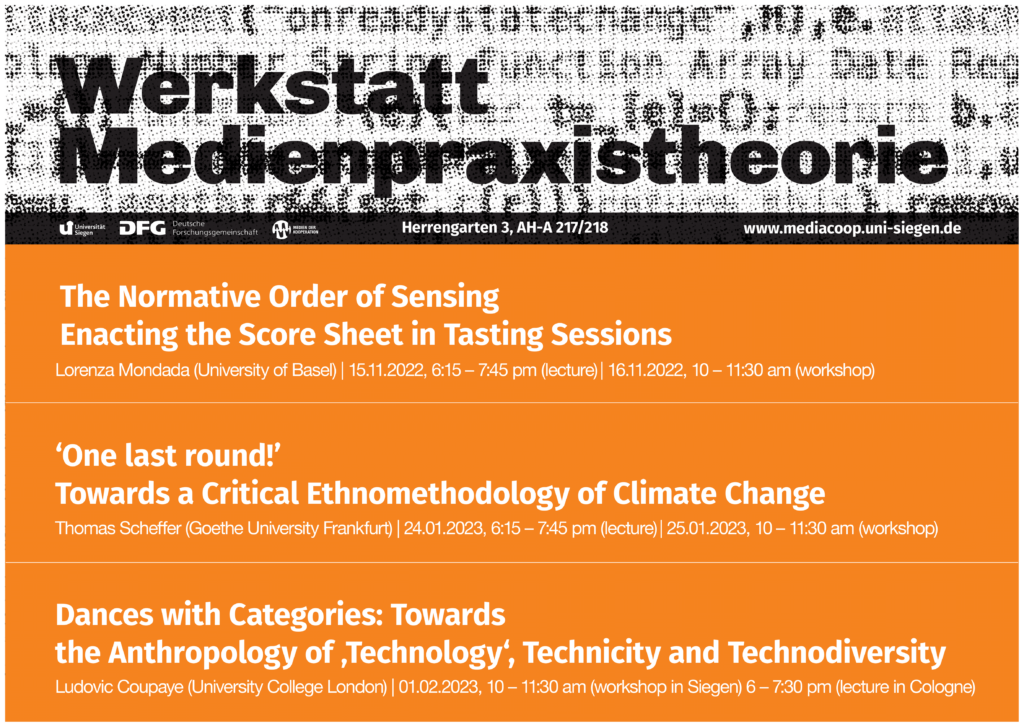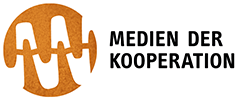Werkstatt Medienpraxistheorie Winter 2022/23

Vorträge und Workshops im Wintersemester 2022/23:
Dienstags um 18:15 (Vortrag)
Mittwochs um 10:00 (Workshop)
Tasting sessions represent a perspicuous setting for a praxeological approach of sensoriality: they are a social activity in which the senses and the sensorial features of objects are the main focus of the participants. Tasting sessions are an activity in which participants do not merely eat (Mondada in press, Fele 2019), do not just taste (without having to verbally express a judgment, contrary to other settings, Mondada 2021), but taste in order to precisely describe what they sense (Liberman 2013, 2018, Mondada 2020, 2022, in press, Mondada & Fele 2020), using specific repertoires of descriptors. Thus, the activity crucially articulates sensations and their linguistic expression. However, this activity is more than just the association of a sensing body and some language. It is a practical situated achievement that relies on a specific understanding of what sensoriality is, its relation to language and, crucially, its relation to culture, expertise, and institutionality — represented by the use of a range of semiotic and lexical tools (such as the Aroma wheel). These tools constrain the expression of sensoriality and authorize some descriptions, while discrediting others. In this way the senses are normatively disciplined. This paper shows how the body, materiality, language, and normative constrains are practically managed and bodily aligned by the participants of tasting sessions. In this way, it provides for an account of the sociality of the senses that does not rely on a global deterministic sociological account but on the subtle ways in which the senses are normatively disciplined within situated occasions of sensing.
The talk unfolds mundane events in the light of the members‘ methodical responses to pressing tasks. It discusses the practical as well as analytical status of climate change as an omnipresent existential problem, questioning the reproduction of society. This is why the events implicate the sociologists in various membership categories: as bystander, participant, and contemporary.
Thomas Scheffer is professor for sociology with an emphasis on interpretative social research. He worked and published on asylum, law policing, political work, and, recently, on sociology and climate change. His research methods cover CA, MCA, studies of work, ethnography, and discourse analysis. He developed the trans-sequential analysis for linking events and processes of meaning production.
This lecture explores how “Technology” is a category vernacular (emic) to modernity which, when used, inscribes the phenomena it refers to within an utilitarian, rationalist and Eurocentric frame. Building on the works of the Francophone Technologie Culturelle, the paper suggests going back to Marcel Mauss’s definition of “technical acts”, focalising on the issue of “efficacy”. The paper claims that it is by taking seriously the efficacy according to the actors themselves, whether computer engineers, long yam growers or shamans, that one can built a methodological frame able to empirically analyse technical (or ritual or aesthetic) phenomena, and their profound axiological import, without sacrificing their material or conceptual diversity, or their spatial or temporal complexity. It opens up with a call for an anthropology of technicity and technodiversity which analyse the different modalities of actions and relations between humans and their milieus.


